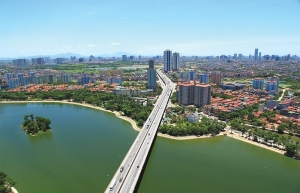Burden imposed on land rent switch
 |
| Tran Thai Binh, Lawyer, LNT & Partners |
In reference to Decree No.103/2024/ND-CP on land use fees and land rent, effective August 2024, rent is based on the land price table issued by province-level people’s committees. In 2024, most provinces significantly adjusted land prices, resulting in substantial increases in rent. For example, some land prices in Ho Chi Minh City have been adjusted up 12-fold in certain areas.
Adjusting land price to align with the market price is necessary to comply with the Law on Land. This should be a normal development to new land leases. However, with previous land leases, Decree 103 does not seem to provide transitional measures or guidelines to help such corporate land tenants to adapt to these sudden changes.
A foreign-led company established in 2000, and which signed a land lease with stabilisation of land rent for five years (with any increase capped at 15 per cent of the preceding rent rate as permitted previously), is now questioning whether this capped increase is still pursuant to the agreement, or whether it must comply with the new rate. This situation really poses a difficult question to answer, and there are many such cases.
While Article 53 of Decree 103 also regulates a transitional clause allowing the existing land tenants to continue benefiting from the land rental applied to its ongoing stabilisation, it lacks a specific guideline on enforcing the cap agreed upon between the tenant and the province. The Land Law 2024 also establishes a principle that land rent shall be stabilised in five years, then adjusted in accordance with Decree 103 after the five-year period.
Several governmental authorities interpret this provision to mean that any previous incentives should end after the stabilisation period, and the new adjusted land rent must be applied. This interpretation is also based on the fact that Decree 103 prevails over any previous provisions on land rents.
From the perspective of contract law, the land lease executed between the land tenant and the landlord (a provincial authority) is a legal-document which should be upheld throughout the lease term. As such, this places governmental authorities in a dilemma.
Applying a new adjusted rent that exceeds 15 per cent cap stipulated in the agreement may constitute a contractual breach by the landlord, whilst the landlord has to follow the new rent adjustment policy, which leaves no room to such an authority for discretion in determining land rents different with the new land rent policy.
From the tenant’s perspective, although the new land laws impose a cap on the adjustment rate, limiting it to the total annual consumer price index of the entire country over the preceding five years, this rate may not be applied to this transition case. Clearly, the tenant may still face significant costs if the new land price is applied.
It is clear that provincial authorities may not be able to resolve this issue effectively. It will likely require submission to higher-level authorities for further guidance and even policy amendment, which can be a lengthy and time-consuming process for enterprises.
The policy of capped land rent adjustment had its historical justification. This was introduced as an assurance and incentive to attract foreign projects in the 2000s. Over time, the land price in Vietnam has been increased significantly, making this policy seem outdated, and resulting in losses for the state budget.
One could argue that the cap as previously agreed should no longer be applicable or enforceable for the remainder of the lease term. Even so, from an economic perspective, investments in that period contributed significantly to the economy generally and also to the development of the real estate market, which has led to the multiple price adjustments. Therefore, it is hard to say view such outcomes as losses.
There is a cornerstone principle under the Law on Investment, allowing investors to continue enjoying existing investment incentives amid law changes. This reflects a commitment by the Vietnamese government to policy stability. Enterprises may rely on this principle to appeal the rent hike with government authorities.
By reviewing the rent-hike matter, we also identify the similar challenge potentially affecting many enterprises that are tenants in industrial parks. While the tenants may have completed payments to the industrial park developers, the rent adjustments could have a serious impact on developers and tenants.
A useful tip to prospective tenants is to conduct a thorough legal due diligence to confirm whether the landlords have completed rent payments to the state for the industrial area, or at least the specific area to be leased to the tenant, before paying full rent for the entire lease term to the developers.
The shortcomings that arise when introducing new policies are all too clear. As such, a thorough economic and social-impact assessment should be conducted in constructing the new policy.
 | Business concerns apparent on land law The business community is still unclear about draft decrees related to land prices and implementation of the new Land Law. |
 | Land Law 2024 disseminated to Vietnamese community abroad The Ministry of Foreign Affairs' State Committee for Overseas Vietnamese (SCOV) in coordination with the Hanoi Bar Association organised a conference on June 27 to popularise regulations and laws regarding the Land Law 2024 of Vietnam to overseas Vietnamese (OVs). |
What the stars mean:
★ Poor ★ ★ Promising ★★★ Good ★★★★ Very good ★★★★★ Exceptional
Related Contents
Latest News
More News
- Citi economists project robust Vietnam economic growth in 2026 (February 14, 2026 | 18:00)
- Sustaining high growth must be balanced in stable manner (February 14, 2026 | 09:00)
- From 5G to 6G: how AI is shaping Vietnam’s path to digital leadership (February 13, 2026 | 10:59)
- Cooperation must align with Vietnam’s long-term ambitions (February 13, 2026 | 09:00)
- Need-to-know aspects ahead of AI law (February 13, 2026 | 08:00)
- Legalities to early operations for Vietnam’s IFC (February 11, 2026 | 12:17)
- Foreign-language trademarks gain traction in Vietnam (February 06, 2026 | 09:26)
- Offshore structuring and the Singapore holding route (February 02, 2026 | 10:39)
- Vietnam enters new development era: Russian scholar (January 25, 2026 | 10:08)
- 14th National Party Congress marks new era, expands Vietnam’s global role: Australian scholar (January 25, 2026 | 09:54)

 Tag:
Tag:
















 Mobile Version
Mobile Version